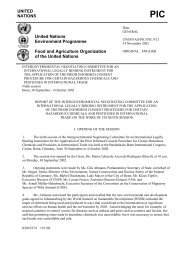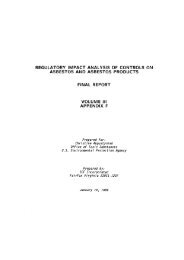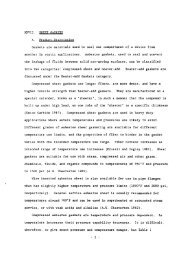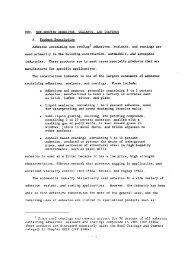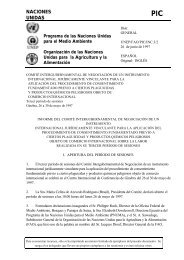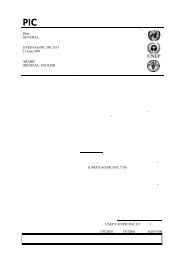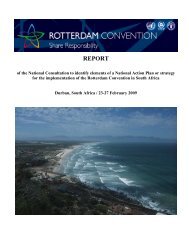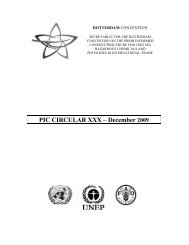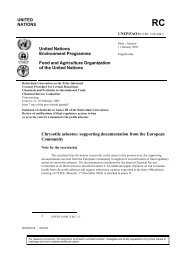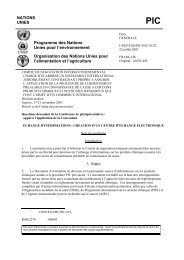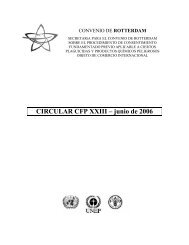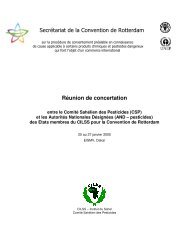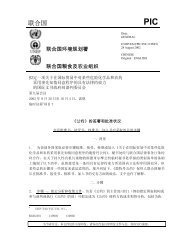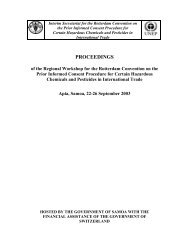Rep o rt of th e tw en - Rotterdam Convention
Rep o rt of th e tw en - Rotterdam Convention
Rep o rt of th e tw en - Rotterdam Convention
You also want an ePaper? Increase the reach of your titles
YUMPU automatically turns print PDFs into web optimized ePapers that Google loves.
(PD) works wi<strong>th</strong> <strong>th</strong>e suppo<strong>rt</strong> <strong>of</strong>ficers like Deputy Director (IPM), Deputy Director (V.P.C), Assistant<br />
Director (IPM), Entomologist, Plant Pa<strong>th</strong>ologist and o<strong>th</strong>ers.<br />
A SPPS in Bangladesh achieved success in <strong>th</strong>e introduction <strong>of</strong> IPM in <strong>th</strong>e country and created<br />
<strong>en</strong>ormous impetus and interest among farmers, ext<strong>en</strong>sion functionaries, policy level <strong>of</strong>ficers, research<br />
workers and politicians. The IPM activities under <strong>th</strong>e project operated in 201 upazilas <strong>of</strong> 64 districts.<br />
The training <strong>of</strong> farmers (male and female) in rice and vegetable IPM was <strong>th</strong>e main <strong>th</strong>rust <strong>of</strong> <strong>th</strong>e<br />
project. The farmers’ training was done <strong>th</strong>rough FFSs. A total <strong>of</strong> 8 500 FFSs would be established<br />
during <strong>th</strong>e compon<strong>en</strong>t period, and 212 500 farmers will receive practical, field ori<strong>en</strong>tation and season<br />
long training in IPM <strong>of</strong> rice and vegetables. The compon<strong>en</strong>t will assist <strong>th</strong>e DAE in <strong>th</strong>e developm<strong>en</strong>t<br />
<strong>of</strong> a Strategy and Action Plan for <strong>th</strong>e implem<strong>en</strong>tation <strong>of</strong> <strong>th</strong>e National IPM Policy. Some <strong>of</strong> <strong>th</strong>e<br />
major tasks <strong>of</strong> <strong>th</strong>e compon<strong>en</strong>t include <strong>th</strong>e developm<strong>en</strong>t <strong>of</strong> 1 300 farmer trainers (FTs), establishm<strong>en</strong>t<br />
<strong>of</strong> 7 800 IPM clubs, work on biological control for rice hispa, bringal shoot and fruit borer, and<br />
demonstrations on organic farming.<br />
Plant Quarantine activities have be<strong>en</strong> str<strong>en</strong>g<strong>th</strong><strong>en</strong>ed wi<strong>th</strong> <strong>th</strong>e establishm<strong>en</strong>t <strong>of</strong> additional Plant<br />
Quarantine out-stations to safeguard <strong>th</strong>e country from <strong>th</strong>e <strong>en</strong>try <strong>of</strong> exotic pests and diseases associated<br />
wi<strong>th</strong> <strong>th</strong>e impo<strong>rt</strong>ed plants and plant products. The existing “Plant Quarantine Rule, 1966” was updated<br />
in July 1989. Fu<strong>rt</strong>hermore, <strong>th</strong>e Plant Quarantine Acts have be<strong>en</strong> updated in 2004 as per Seed Rules<br />
<strong>of</strong> Bangladesh. An additional new four out-posts will be established to str<strong>en</strong>g<strong>th</strong><strong>en</strong> land border Plant<br />
Quarantine activities.<br />
The registration <strong>of</strong> pesticides was regulated by <strong>th</strong>e existing “The Pesticide Ordinance, 1971”<br />
and “The Pesticide Rules, 1985”. An attempt was made to review existing pesticides found harmful<br />
to <strong>th</strong>e <strong>en</strong>vironm<strong>en</strong>t and fishery for <strong>th</strong>e purpose <strong>of</strong> registration/banning. There are nine pesticide<br />
formulation plants in <strong>th</strong>e country. About 50 perc<strong>en</strong>t <strong>of</strong> <strong>th</strong>e total pesticides were impo<strong>rt</strong>ed as finished<br />
product. In <strong>th</strong>e Plant Protection Wing, a pesticide laboratory is available for testing <strong>th</strong>e physical<br />
prope<strong>rt</strong>ies and active ingredi<strong>en</strong>t (AI).<br />
The Rod<strong>en</strong>t Control Campaign was organized in 1983 to create awar<strong>en</strong>ess among <strong>th</strong>e g<strong>en</strong>eral<br />
public regarding <strong>th</strong>e m<strong>en</strong>ace <strong>of</strong> rats and to develop <strong>en</strong>couragem<strong>en</strong>t for timely control measures.<br />
Through <strong>th</strong>is campaign rat damages have be<strong>en</strong> reduced considerably.<br />
3.3 Cambodia<br />
The Plant Protection Service <strong>of</strong> <strong>th</strong>e Depa<strong>rt</strong>m<strong>en</strong>t <strong>of</strong> Agronomy and Agricultural Land<br />
Improvem<strong>en</strong>t has four activities:<br />
i. Research on pest problem on major crops<br />
ii. Plant quarantine<br />
iii. Pesticide analysis<br />
iv. Pest control and ext<strong>en</strong>sion<br />
The first <strong>th</strong>ree activities have research and regulatory functions. IPM focused more on farmers<br />
<strong>th</strong>rough <strong>th</strong>eir pa<strong>rt</strong>icipation in Farmer Field Schools. Plant protection activities focused mainly on<br />
<strong>th</strong>ree areas, <strong>th</strong>at is, insect, disease, and weed managem<strong>en</strong>t.<br />
The pest damage on rice and especially on vegetable production was <strong>th</strong>e main constraint for<br />
Cambodian farmers. Outbreaks <strong>of</strong> brown plant hopper, armyworms, grasshopper (Locusta) and rats<br />
were repo<strong>rt</strong>ed for rice in 1998, 1999 and 2000. Numerous insect pests, diseases and weeds were<br />
known to pose serious obstacles to crop production in Cambodia.<br />
10



